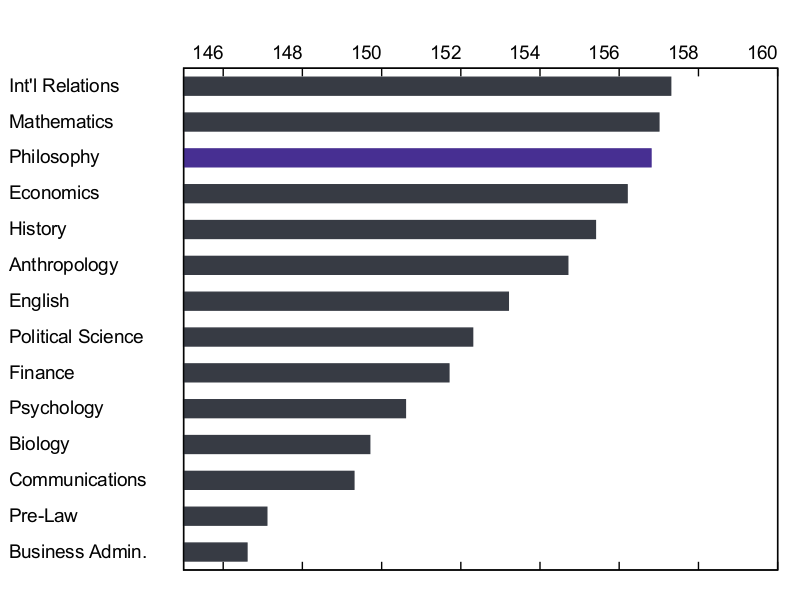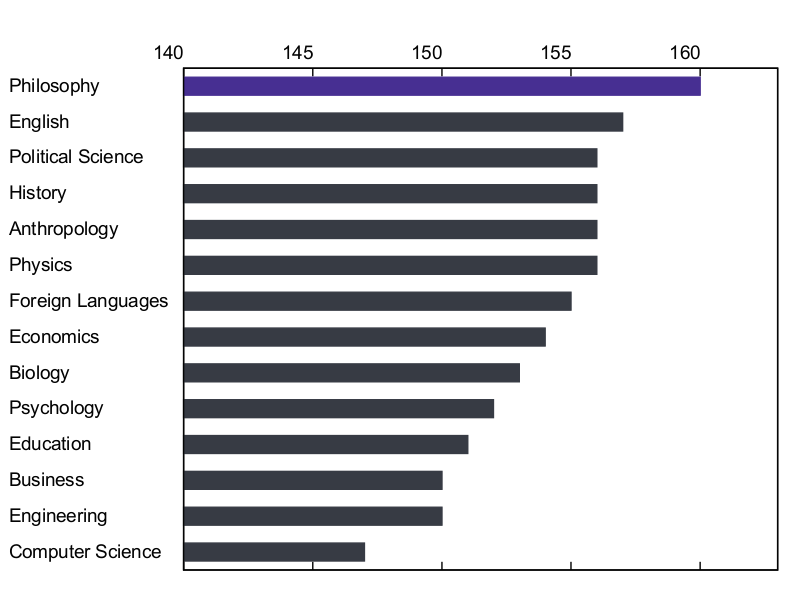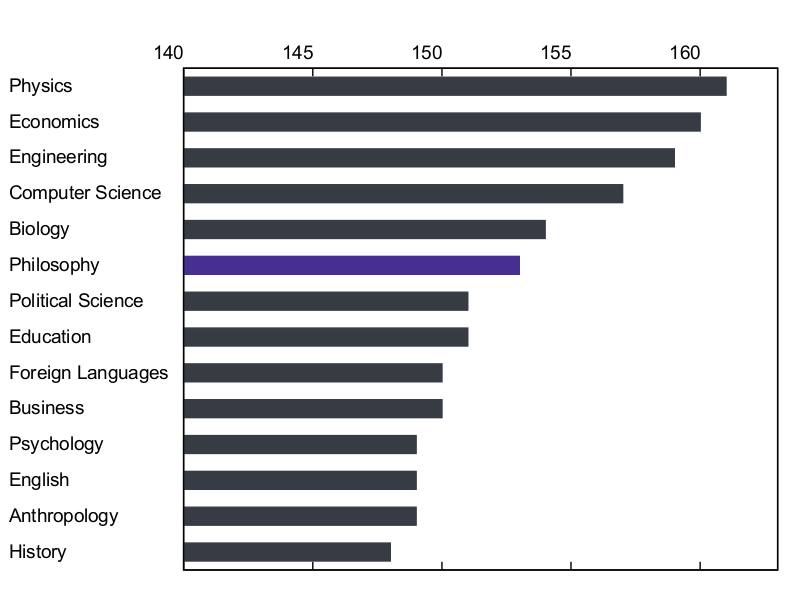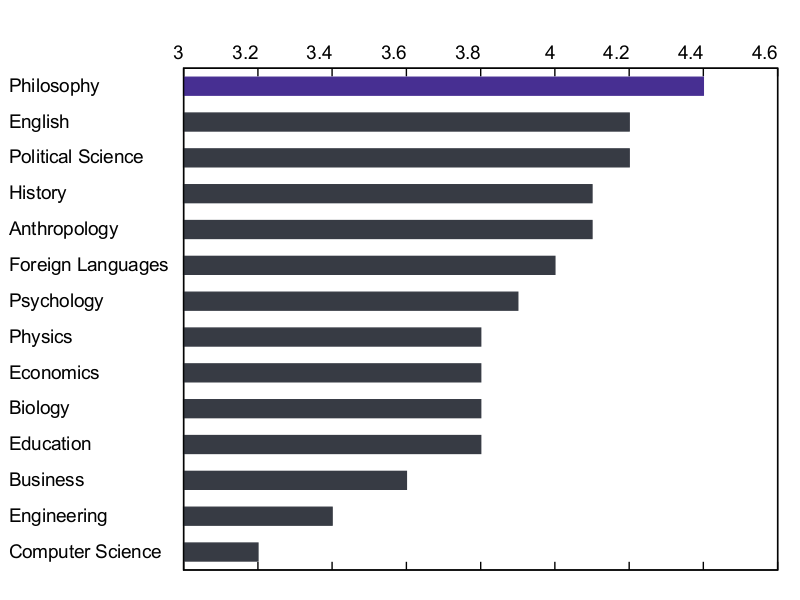Why Study Philosophy?
Some Practical Information for Prospective Philosophy Majors
Socrates famously claimed that the unexamined life is not worth living. The credo of philosophy in general could well be that everything is worth examining, and philosophers examine all manner of esoteric things: truth, justice, beauty, knowledge, antinomies, possible worlds, various kinds of concreta and abstracta (as well as the distinction between such), and on and on. This leads many people mistakenly to think that a BA in philosophy has no practical value, where ‘practical value’ is understood to mean something like usefulness in finding and keeping a “real" job. Nothing could be further from the truth. In what follows you will find some data and sources of information that give the lie to the myth of philosophy's practical uselessness.
It's well known that a BA in philosophy provides excellent preparation for study in a philosophy graduate program as well as in law school. The superior performance of intended philosophy graduate students on the GRE and philosophy majors on the LSAT are evidence of this.
GRE Scores
LSAT Scores
 On the LSAT chart, philosophy is ranked #3.
On the LSAT chart, philosophy is ranked #3.
GMAT Scores
 On the GMAT chart, philosophy is ranked #4.
On the GMAT chart, philosophy is ranked #4.
Less well known is that a BA in philosophy also provides excellent preparation for employment in a variety of business settings. In a nutshell, the chief skills developed in a rigorous philosophy curriculum are the ability to communicate clearly and effectively, especially (but not exclusively) in writing, along with the ability to critically analyze and creatively solve complex problems. These skills are being increasingly recognized and valued by business.
On this, see:
- Philosophy is Back in Business
- Philosophy's Makeover
- I Think, Therefore I Earn
- The Unexpected Way Philosophy Majors Are Changing The World Of Business
Some have even recently seriously entertained the idea that philosophy is the most practical undergraduate major:
Finally, mid-career median earnings of persons with just a BA in philosophy ($84,000) compare very favorably to similar earnings of persons with just a BA in another humanities discipline or a social science. Among humanities and social sciences, philosophy is in the top 10 for both starting and mid-career median earnings.
Areas of Philosophy
Philosophy can be divided into a number of areas, or subfields, though these areas overlap. These areas cluster together in fairly standard ways, though overlap between areas, even areas in different clusters, is not uncommon, and there can be slight variations in the clusters themselves.
History of Philosophy
The history of philosophy studies both major philosophers, such as Plato, Aristotle, Aquinas, Descartes, Hume, Kant, Hegel, and Nietzsche, as well as entire periods in the development of philosophy. The history of philosophy is normally divided into the ancient, medieval, modern, nineteenth-century, and twentieth-century periods. It seeks to understand great figures, their influence on others, and their importance for contemporary issues. It sometimes separately studies major philosophical movements within a single nation, such as American Pragmatism, British Empiricism, and German Idealism. The history of philosophy not only provides insight into the other subfields of philosophy; it also reveals many of the foundations of Western Civilization.
Continental Philosophy
The term “continental philosophy” commonly refers to 19th-century, 20th-century, and contemporary German and French philosophy. It includes areas such as phenomenology, existentialism, critical theory, structuralism, post-structuralism, hermeneutics, and deconstruction. Principal figures include Hegel, Marx, Kierkegaard, Nietzsche, Husserl, Heidegger, Adorno, Sartre, Foucault, Derrida, Deleuze, Nancy, and Badiou.
Metaphysics and Epistemology
Traditional metaphysics addresses the question “What is there, and what is it like?" Traditional epistemology addresses the question "What is knowledge, do we have any, and if so how do we come by it?" In addition to these areas, this cluster contains the areas of philosophy of mind, philosophy of language, philosophy of mathematics, philosophy of science, philosophy of religion, and formal epistemology. Some of these areas have subareas of their own. For example, philosophy of mind includes the subareas philosophy of perception and philosophy of the emotions, and philosophy of science includes the subareas philosophy of physics, philosophy of social science, and philosophies of special sciences (e.g., psychology and economics).
Logic
Logic is primarily the study of consequence relations (the sort of relation that holds between the premises and conclusion of a “good” argument) and related notions. Among the subareas of logic are classical first-order and higher-order logics, non-classical logics (e.g., modal, intuitionistic, relevance, and many-valued logics), mathematical logic (set theory, computability theory, model theory, and proof theory), and history and philosophy of logic.
Value Theory
Value theory comprises the areas of ethics, social and political philosophy, and aesthetics. Ethics itself includes the subareas of normative ethics and metaethics. Normative ethics addresses questions about right conduct ("What should we do?" "Which actions are morally permissible or impermissible?"), while metaethics concerns the metaphysical and epistemological commitments of normative ethical theories, or the components of normative ethical theories (e.g., moral discourse).


